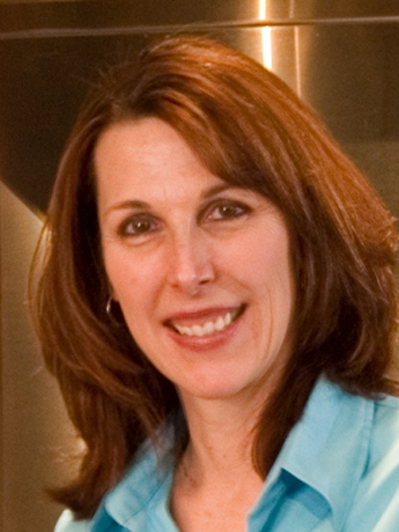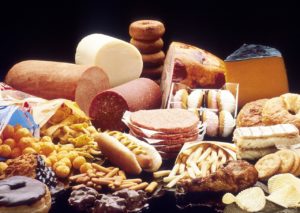One Woman’s Quest to Restore Good Nutrition

The Dalai Lama, when asked what surprised him most about humanity, said:
“Man.
Because he sacrifices his health in order to make money.
Then he sacrifices money to recuperate his health.”
That quote was shared with me by Susan Buckley, Registered Dietitian and the Nutrition Manager at South Denver Cardiology, one of Denver’s premier cardiac medical practices. I interviewed Susan for this article after attending several of her free nutrition presentations at SDC. I was impressed with the depth and breadth of her nutrition knowledge – and her commitment to revealing the truth about the sad state of nutrition in our society.
Susan has a pretty amazing personal story. A southern California native, she grew up in a household where her mother didn’t cook much so there was lots of fast food. She struggled for years with her weight, going from 118 pounds to 180 during her high school years.
Like many facing this condition, she tried lots of diets with the typical see-saw results. The tipping point for her was when she reached 200 pounds following the birth of her second daughter.
She didn’t want her daughters to grow up with a “disordered relationship with food and their bodies” so she committed to the Weight Watcher program and decided to go back to school to become a dietitian, earning a degree in dietetics and doing an internship at the St. Louis VA Medical Center.

And she dropped 70 pounds – and kept it off!
Susan is a long-standing member of the National Weight Control Registry which is a research study that includes people 18 years or older who have lost at least 30 lbs of weight and kept it off for at least one year. There are currently over 10,000 members enrolled in the study, making it perhaps the largest study of weight loss ever conducted.
She shared with me that the commonality they have discovered through the Registry is that it is a cohort of breakfast eaters and exercisers. Those are two consistents in her life also. And her exercise includes strength training multiple times a week.
As Nutrition Manager at South Denver Cardiology, she does a lot of one-on-one consulting as well as teaching classes on a variety of topics such as diabetes, cholesterol, high blood pressure, and different diet plans. She also teaches some cooking classes. All this typically consumes one day of her week.
The rest of her week is spent in her private practice where she consults with people who have severe, life-altering food sensitivities such as migraines, irritable bowel syndrome, reflux, and autoimmune disorders. She tells of clients who suffer from devastating migraines who can’t leave their homes for days and have exhausted their options with their doctors. She works with these types of clients to do food sensitivity blood tests to determine what foods are causing severe inflammation in the body and then does a food elimination diet to reduce or eliminate the inflammation.
The results have been remarkable.
Susan exudes passion and confidence. Tall, slender and fit, she portrays what she preaches.
I asked Susan if she is optimistic or pessimistic about the future when it comes to nutrition in our culture. She admits to going back and forth on this. My sense is that she tilts a bit to the pessimistic side as one who is immersed in understanding the tremendous forces working against us in trying to achieve widespread healthful nutrition.
 She told me: “it’s almost impossible to sustain a healthy lifestyle in the environment we’ve created. Our society is set up for convenience and high calories – and we combine it with all kinds of labor-saving devices.”
She told me: “it’s almost impossible to sustain a healthy lifestyle in the environment we’ve created. Our society is set up for convenience and high calories – and we combine it with all kinds of labor-saving devices.”
She bristles a bit as she explains how effective food companies are at designing foods to hit the “bliss point” where one bite, or one chip, or one sip builds a craving for another. Bliss points aren’t aimed at what’s good for the body. Remember the “betcha can’t eat just one” ads for potato chips. That’s a core food design principle. And it’s where a lot of our “pretend” food or “toxic food-like substances” come from.
In her world, she observes how entrenched bad eating habits are in our society and how incredibly difficult it is to change nutrition habits. Our taste buds have been held captive since childhood. Despite that, she has seen people make healthy long-term changes in their lives through her coaching.
She places her hope for the future with children, on reaching them while they are still malleable with a message of how important good nutrition is. To tackle the childhood obesity epidemic, she feels we are going to have to work through the schools and the food companies. She laments the horrific food offerings in our school systems and blames food companies for turning a blind eye to the health impact that their products are having on our children.
Susan mentioned the work that Dr. Mark Hyman is doing to work with food companies to try to convince them to produce “real food” rather than “chemical food” which we know can affect the brain.
Susan has co-authored two books: “The Kardea Gourmet: Smart and Delicious Eating for a Healthy Heart” and “Cooking With Heart”. Both were co-written with Dr. Richard Collins, a retired cardiologist from South Denver Cardiology and a former partner in presenting many cooking and food selection classes at SDC.
I love the quote she shared with me that she borrowed from Dr. Collins. It clearly speaks to where we are today:
“It takes 2 calories to roll down a car window to get a 700 calorie breakfast”
It makes you appreciate what she is up against. And what she’s been through. And the worthiness of where she is going.
You can find out more about Susan and her practice at www.susanbuckleynutritionsolutions.com





Great article! This is a huge issue and I appreciate Susan sharing her story through you! I wish her well and share her concerns with the future of our food choices.
Wohh exactly what I was searching for, thanks for putting up.
You made some decent factors there. I appeared on the web for the problem and located most individuals will go along with along with your website.